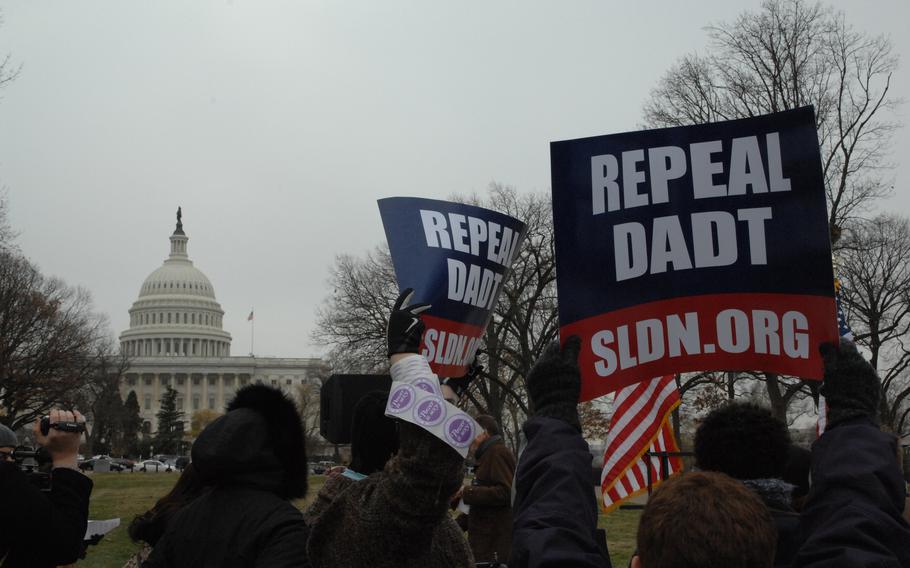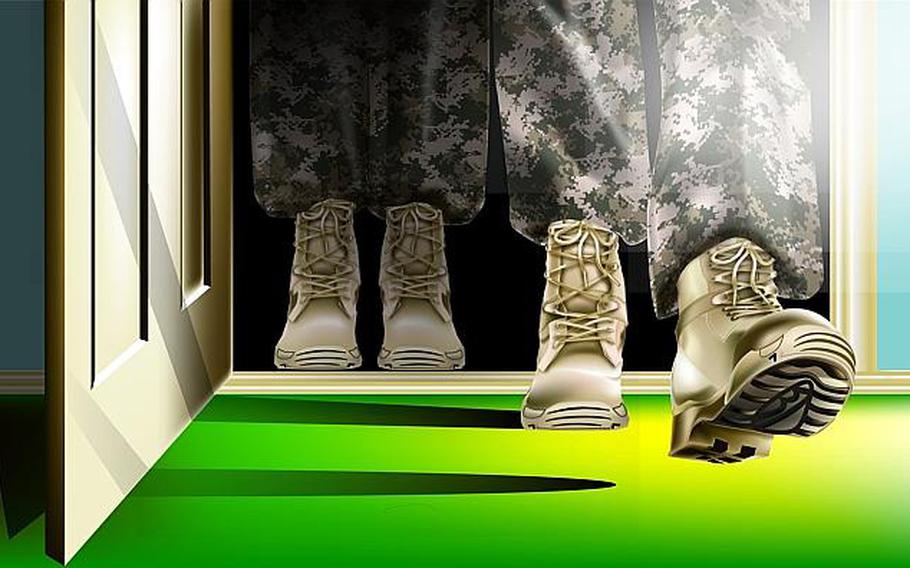
Advocates of the repeal of the military's ''don't ask, don't tell'' policy gather outside the U.S. Capitol Dec. 10, 2010, a day after the repeal effort died in the Senate. (Rick Vasquez/Stars and Stripes)
This article first appeared in the Stars and Stripes Sept. 20, 2011. It is republished unedited in its original form.
WASHINGTON — “Don’t ask, don’t tell” is history.
After 18 years of controversy and questionable results, the law that forced the removal of more than 14,000 gay troops and left untold thousands more to risk their careers to keep a perilous secret was officially repealed Tuesday. Now, military leaders have replaced that policy with one specifically prohibiting discrimination against any servicemembers because of their sexual orientation.
“Thanks to this change I believe we move closer to achieving the goal at the foundation of the values that America is all about: equality, equal opportunity and dignity for all Americans,” Defense Secretary Leon Panetta told reporters Tuesday. “These are men and women who put their lives on the line in defense of this country, and that’s what should matter the most.”
Joint Chiefs Chairman Adm. Mike Mullen, who became a leading voice for repeal, on Tuesday said the law was “against everything we stood for as an organization, forcing people to lie to wear a uniform. We’re better than that.”
He predicted no major disruption for military personnel — gay or straight — now that the law is gone.
“Tomorrow they’ll all get up, they’ll all go to work, and they’ll all be able to do that work honestly, and their fellow citizens will be safe from harm,” Mullen said. “That’s all that matters.”
The repeal marks the culmination of a decades-long emotional fight by gay rights activists. Their goal appeared within reach in 1992 when President Bill Clinton pledged to change the military’s anti-gay stance. But his compromise “don’t ask, don’t tell” law, approved by Congress after military officials balked, became reviled by opponents and proponents of the gay rights movement.
Some gay troops were outed and dismissed without any public admission of their sexual orientation, and critics said the law was applied unfairly against lesbians, who were kicked out at a higher rate than their gay male counterparts. Yet troops with more lenient commanders served openly for years without any repercussions, and gays in combat units saw their dismissal rates fall dramatically after the wars in Iraq and Afghanistan began.
At a Capitol Hill press conference Tuesday celebrating the repeal, Marine Corps reservist Capt. Sarah Pezzat stood alongside lawmakers and other previously closeted servicemembers and unburdened herself of her secret.
“I’m 31 years old, I’m a woman, I’m a Marine and I’;m a lesbian,” she announced, smiling and tearing up at the same time. “Prior to today, if I had said that I could have expected to be discharged from the military. I love the Marine Corps, which is why I haven’t been able to leave it, even though ‘don’t ask, don’t tell’ made my life pretty miserable.”
She deployed to Haiti, Africa and Iraq as an active-duty servicemember before leaving service in 2007 because “I felt like I had to keep putting my family back in the closet.” She was mobilized to active duty again last February, but had kept her sexual orientation secret.
“I’m grateful today to be able to serve my country with integrity and my dignity intact,” she told reporters. “I feel like today is a great day for the Marine Corps, and the Corps only gets stronger today.”
Last December, over objections from conservative lawmakers about to take control of Congress, lame-duck lawmakers voted to dump the law, pending a lengthy training and preparation period. Defense officials said more than 2.3 million U.S. troops have now been briefed on post-repeal rules and changes, emphasizing “dignity and respect” for all servicemembers.
In a statement, President Barack Obama said the end of “don’t ask, don’t tell” will not only uphold America’s promise of equality for all but also make the military stronger.
“As of today, patriotic Americans in uniform will no longer have to lie about who they are in order to serve the country they love,” he said. “As of today, our armed forces will no longer lose the extraordinary skills and combat experience of so many gay and lesbian service members.”
Conservatives objected to the change up until the Tuesday midnight deadline.
The Family Research Council, which publicly opposed repeal, urged Pentagon leaders to maintain the status quo until lawmakers could investigate whether military officers were unfairly pressured into supporting repeal. A pair of House lawmakers tried to block repeal last week by insisting that defense officials hadn’t yet provided them with proper paperwork.

After 18 years of controversy and questionable results, the law that forced the removal of more than 14,000 gay troops and left untold thousands more to risk their careers to keep a perilous secret was officially repealed. (Bev Schilling/Stars and Stripes)
But early Tuesday morning, Pentagon leaders began distributing the new non-discrimination rules to military commands, stating that “gay and lesbian servicemembers, like all servicemembers, shall be evaluated only on individual merit, fitness and capability.”
On Monday, groups of gay servicemembers gathered to count down to midnight when the repeal became official.
At a San Diego bar, Sean Sala, a former Navy operations specialist, addressed the gathered revelers, many of them active-duty servicemembers.
“You are all heroes,” he said, according to The Associated Press. “The days of your faces being blacked out on the news — no more.”
In Vermont, Navy Lt. Gary Ross and his partner of 11 years were married before a small group of family and friends.
“I think it was a beautiful ceremony,” Ross told AP early Tuesday. “The emotions really hit me ... but it’s finally official.”